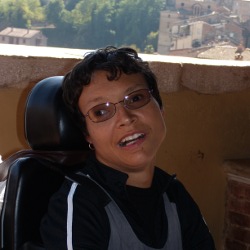
Katrina Jirik University of Minnesota 2012-2013 Dissertation Research Fellow
Thanks to the generosity of a Dissertation Research Fellowship from the Philadelphia Area Center for the History of Science, I spent the equivalent of a month living and conducting research in Philadelphia. My research focuses on the transition of American institutions for the feeble-minded from small, generally private schools to large, publicly funded, custodial institutions. The initial development of these schools began in the Northeast, with the first being established in Massachusetts. Larger institutions, with a mix of state and private funding, were established in Pennsylvania and New York shortly thereafter. Following the Civil War, institutions for the feeble-minded spread across the Midwest, and to California. My primary aim in conducting my research in Philadelphia was to gather information on these early institutions as they moved into the twentieth century. I wanted to be able to compare and contrast these older institutions with the new ones that were springing up. In Philadelphia, I visited the American Philosophical Society, The Library Company, the Historical Society of Pennsylvania, and the College of Physicians of Philadelphia. The American Philosophical Society had copies of the annual reports of the Massachusetts School for Idiotic and Feeble-minded Youth, the publicly funded state institution, beginning in 1848. They also had monographs by Samuel Gridley Howe detailing much of the work he undertook to convince the state legislature of the need for this type of establishment. These sources provide me with excellent information on the thoughts and motivations of individuals and governmental agencies associated with the start of what I call, “the bureaucracy of care.” The Historical Society of Pennsylvania had annual reports for the Pennsylvania institution from its start in 1853. Annual reports, which were often to the state’s legislature are important because not only do they document what is happening at the institution but the reports were also disseminated to other institutions, including international ones, and to the interested public as a means of outreach. The archive also had pamphlets on feeble-mindedness that were published between 1910 and 1920. These pamphlets, written for the general public, reflect the changing understanding of feeble-mindedness that was behind the push for increased custodial care. The Library Company had annual reports from New York, Ohio and Illinois. The reports from Illinois were a valuable find because the Illinois State Archive does not have any of the reports. These reports include a copy of the parent satisfaction survey and a summary of the responses. This is fascinating information as parents’ perspectives on the institutions for the feeble-minded that served their children is a vastly unrepresented area of investigation. It also indicates that there was an interactive dynamic going on between the institutional staff and parents and that parents’ perspectives mattered to the institution staff and by extension, to the wider arena of funding and oversight agencies. I spent most of my time at the College of Physicians of Philadelphia which has a wonderful and eclectic collection. The library has the records of the Elm Hill School, the first school/institution for children with feeble-mindedness in the United States. The records include photo books, expense accounts, annual reports, examples of student work, and some information on staffing. The library also has an extensive collection of pamphlets and articles related to feeble-mindedness. It also has copies of the Illinois’ institution newspaper to which hundreds of people subscribed. It also had reports from the institution in California. Neither of these states’ archives had these sources. The College of Physicians also had reports from various oversight agencies from a number of different states. These resources will help me piece together the complicated development of a “bureaucracy of care” that occurred around the turn of the twentieth century. I greatly appreciate the opportunity afforded me by the Philadelphia Area Center for the History of Science to conduct such fruitful research at the various archives in Philadelphia. The program staff was exceptionally understanding and helpful on a number of issues.